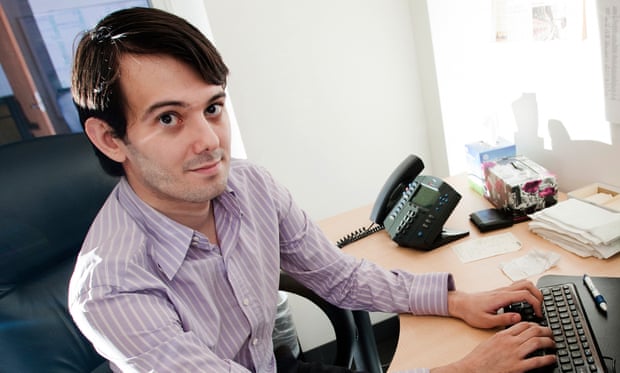
Turing Pharmaceuticals raised the price of a life-saving drug more than 55 times the original cost. The price-gouging has caused a serious media and medical outcry.
The high cost of pharmaceuticals is a widespread issue in the United States. Pharmaceutical price-gouging is something that presidential candidates are trying to combat, but the seriousness of the problem wasn’t as clear until the cost of a life-saving drug was raised by 5500 percent.
Turing Pharmaceuticals of New York acquired the rights to Daraprim, a drug that treats infection from a common parasite. After buying Daraprim from Impax Laboratories, Turing increased the cost of the drug from $13.50 per pill to $750 per pill.
A Life-Saving Drug

Daraprim is on the World Health Organization’s List of Essential Medicines, which means that it is a necessity in a basic health system.
Image: Share Tu
Daraprim, also known as pyrimethamine, has been on the market since 1953. It is an antiparasitic compound that treats protozoal infections such as malaria and toxoplasmosis.
While malaria is almost unheard of in the United States, toxoplasmosis is a frequent cause of illness. Toxoplasmosis, the most common food-borne disease, attacks a weakened immune system. The condition is life-threatening and has the potential to kill patients whose natural defense mechanisms have been weakened from cancer, HIV/AIDS and even pregnancy, according to the CDC.
About 60 million people in the United States may carry the toxoplasma parasite, according to the CDC. The parasite is spread from eating under-cooked meat, drinking unclean water and coming into contact with contaminated cutlery or infected feces.
The parasite can be passed to unborn children during pregnancy or through organ transplants. The flu-like symptoms may seem mild, but the parasite is deadly. It attacks the brain and can cause blindness and brain damage.
Outrage From The Medical Community

The HIV Medicine Association and the Infectious Diseases Society of America are two of the health organizations that have protested the price-gouging of Daraprim.
Image: Blogger
Doctors, patient and other health professionals are outraged by the rising cost of prescription drugs.
Turing Pharmaceuticals was contacted by the HIV Medicine Association and the Infectious Diseases Society of America to share concerns about the high cost. The pricey pill may not be stocked in hospitals if it the institution can’t afford to buy in bulk. But no alternative treatment is effective enough, which means that many patients won’t have access to the medication they need.
The cost increase makes the medication unaffordable, even for people with insurance. High-price drugs are categorized as “specialty” medications, and patients will pay hundreds or even thousands of dollars every year. Most insurance plans require patients to pay 20 percent of the drug cost, which would equate to $150 a pill.
“This is a tremendous increase,” said Judith Aberg, a spokesperson for the HIV Medicine Association.
In 2013, the average cost of medication increased by 13 percent, according to a report from the Prime Institute at the University of Minnesota. Cancer treatments now cost more than $100,000 a year. The brand-name hepatitis C drug, Sovaldi, costs $84,000 for a 12-week treatment.
“Every week, I’m learning about another drug that has increased in price because of a change in marketing or the distributor,” Aberg said.
CEO Set To Lower The Price

In response to the media outcry, Martin Shkreli, CEO of Turing Pharmaceuticals, plans to lower the price. The company hasn’t determined the amount.
Image: The Guardian
Turing said the company is working with hospitals and providers to make the drug accessible through co-pay assistance programs and free-of-charge options for uninsured patients, according to Turing spokesman Craig Rothenberg.
Rothenberg said there is a purpose for the high price. The income will be used to research treatments for toxoplasmosis and invest in marketing and education to promote awareness about the disease. The goal is to develop a toxoplasmosis treatment with less side effects.
“There has been no innovation in dealing with toxoplasmosis,” Rothenberg said. “That has been a long neglect in the patient community.”
But after the medical community expressed their disdain for the price hike, Turing’s CEO Martin Shkreli has agreed to lower the cost by an unknown amount. The company paid $55 million for the rights to Daraprim, and Shkreli claims he’s just trying to get an adequate return on his investment.
“Yes it is absolutely a reaction — there were mistakes made with respect to helping people understand why we took this action, I think that it makes sense to lower the price in response to the anger that was felt by people,” Shkreli told NBC.
On Twitter, Shkreli said he would “set the record straight on misconceptions and announce some adjustments to our plan.” Despite the low production costs, the company still needs to finance “the quality control, the regulatory costs, and all of the other things that come with having a drug company.”
“We’ll know in several weeks how profitable the drug is, if it at all,” Shkreli said in an NBC interview. “It may turn out that’s it not even profitable at all, even at this price.”
CitizensReport
Latest posts by CitizensReport (see all)
- 4 Natural Alternatives To Energy Drinks That Will Make You Feel Healthier - February 19, 2018
- NBC Nightly News Publishes Expose On IVC Filters - February 18, 2018
- Good Sugar, Bad Sugar: Why You Should Eat More Fruit - February 16, 2018


Join the discussion